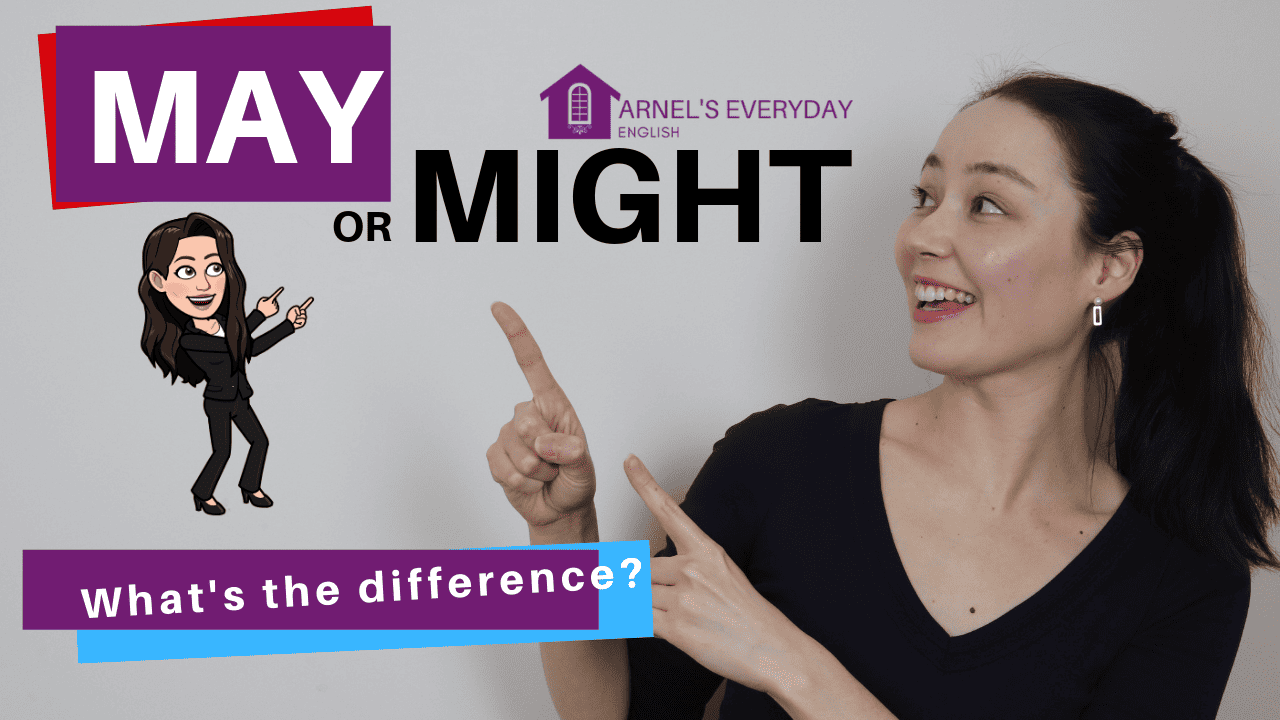When do I use MAY?
When do I use MIGHT?
What’s the difference?
Keep reading! If you are a more visual learner, watch the video!
Let’s take a look at MAY and MIGHT in 5 simple steps:
1.the grammatical structure
2.possibility
in the present and future
3.possibility
in the past (with pronunciation)
4.permission
5.expressing wishes
the grammatical structure
MAY and MIGHT are modal verbs.
Other modal verbs are: can, could, should, shall, will, would and must
Modal verbs are different than ‘normal verbs’. Modal verbs do not change their form:
We do not say:
He/She/It mights.
We also cannot say:
I am mighting / maying.
Yesterday I mighted / mayed.
The verb always remains the same.
possibility in the present and future
may / might + infinitive (no ‘to’)
☑I might order a pizza later. (future)
I might to order a pizza later.
☑My keys may be in my jacket. (present)
My keys may to be in my jacket.
MAY = a stronger possibility
MIGHT = a weaker possibility
My grandma’s heart is not doing very well. She may need to have an operation.
a stronger possibility – Doctors have told me that this is very possible. Not 100% yes, but very possible.
I’m really bored in my job. I might start looking for a new job.
a weaker possibility – I’m not sure. This depends if I really want to leave this job.
Tim and Amy have been fighting a lot lately. They may actually break up soon.
stronger possibility – They argue every day. They are unhappy.
Do you need a babysitter? I might be able to help you! I’ll need to check my work rota.
weaker possibility – This depends on my rota. I cannot be sure yet.
Many native English speakers use MAY and MIGHT in the same way when speaking about possibility. The distinction between MAY and MIGHT is not always recognized.
These two verbs are often interchangeable.
possibility in the past
may / might have + past participle
It’s always ‘may / might have + past participle‘, never HAS.)
The past participle is verb #3:
#1 infinitive: eat
#2 past simple: ate
→ #3 past participle: eaten
Examples:
A: Where’s Jimmy?
B: He may have missed the bus.
stronger possibility – Jimmy is late. Missing a bus is a strong possibility.
B: He might have missed the bus.
weaker possibility – Buses have numbers on them. It’s not very easy to miss a bus.
I might have left the stove on this morning. I’m not sure.
My stomach doesn’t feel very good. It may have been that chicken curry I ate for lunch.
Don’t worry. David may have tried to call you last night. Was your phone on?
I might have left my keys at my mum’s house. I’ll call her and find out.
All of these sentence express a past possibility.
pronunciation
In spoken English, it’s very natural to contract ‘may have’ and ‘might have’:
may have = may’ve
might have = might’ve
may’ve sounds like: may of
might have sounds like: might of
Of course ‘may of‘ and ‘might of‘ are not correct grammatically, but the sound is correct.
permission
We use MAY and MIGHT to ask and give permission in a very polite and formal way.
Excuse me, may/might I use your pen? (asking permission)
Excuse me, may/might I sit here? (asking permission)
Nowadays, ‘might’ for permission is a bit old-fashioned and not very common.
Yes, of course you may use my pen. (giving permission)
Yes, you may sit here. (giving permission)
Mother: Yes sweety, you may have dessert. (giving permission)
Teacher: Okay Harry, you may use the toilet. (giving permission)
Expressing Wishes
We use MAY (not ‘might’) when we want to wish someone else well.
If someone is getting married, you can write in their card: May you both have a long, happy and healthy marriage.
If someone has just graduated from university: May you have all the success and luck in the world.
Are you a Star Wars fan? There’s a famous line: May the force be with you. (This means ‘good luck’.)
In all of the examples above, you are wishing someone else well.
You might also like:
CAN or COULD?









I LIKE IT IT YSEFUL
Wonderful! Thank you Tekeste!
Thank you so much Arnel for your thoroughly explanation on May and Might. I am very happy to find you. Could you please give us the explanation on modal verb ‘Would’. I am very much confused to take this modal. Thanks again and take care 🤗
Hi Saima! Thank you for your lovely comment! I’m so happy you found the lesson useful! Yes, a lesson on ‘would’ is a very good idea. Hopefully I can get one done in the near future! Arnel 🙂